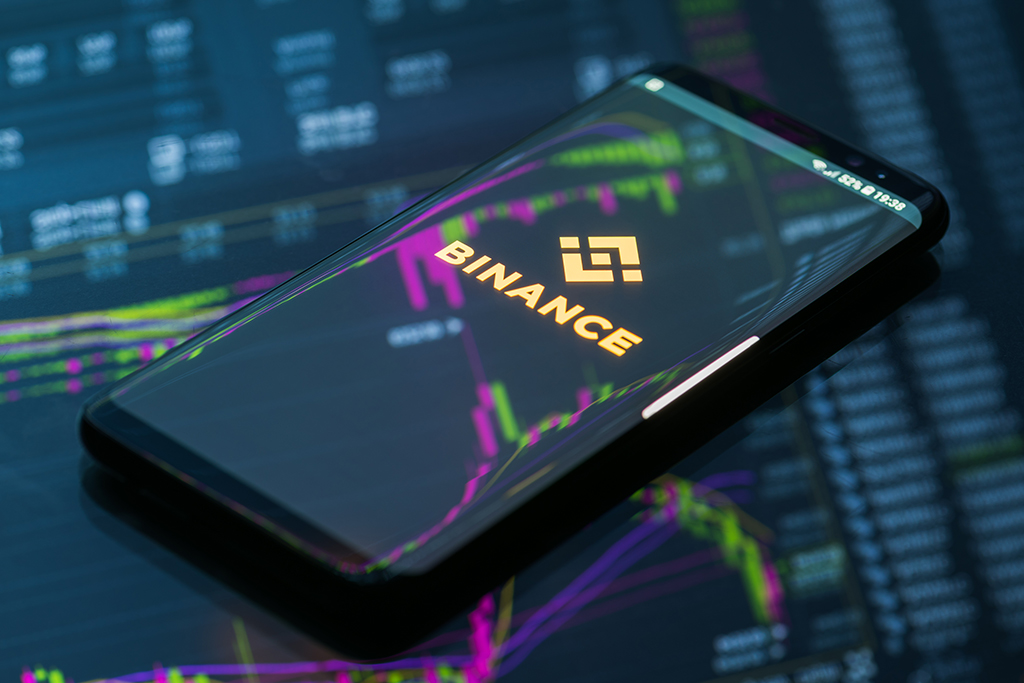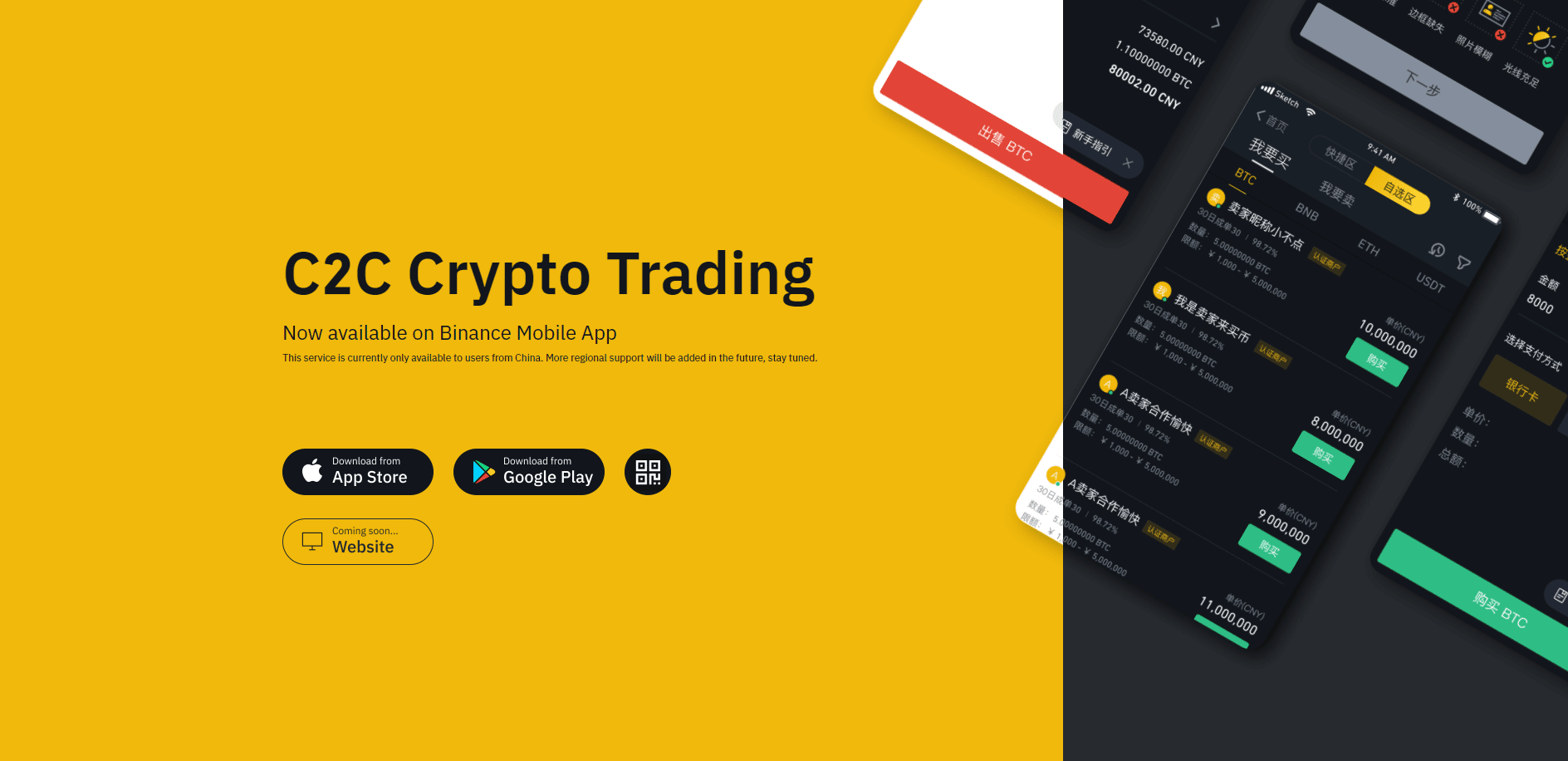
Jeff Fawkes is a seasoned investment professional and a crypto analyst. He has a dual degree in Business Administration and Creative Writing and is passionate when it comes to how technology impacts our society.
Binance is developing new solutions to gather more clients around itself, with the help of the new C2C app dedicated to Chinese users.

Two months have gone since September 30th, when Binance CEO Changpeng Zhao announced via Twitter the new P2P, or OTC, or C2C (as they call it in China) mobile app. He claims that the first two trades via the app already happened back in September. Presumably, between him and one of his friends.
The launch of such a product is a good sign for people who like services like LocalBitcoins or Bisq. As the decentralized exchanges (DEX’es) do not always provide 100% decentralization or liquidity, and P2P OTC trading comes to help.
According to the official service page, the web version of the app is not ready yet despite the announce is made two months ago. This service will be likely to finally allow Binance traders to interact with each other directly. The app is using a convenient interface and usual Binance style to present a new way of buying and selling digital assets.
Why bother with the exchange’s endless rules, when you can buy from your friend from another city via mobile app, without any risks? The fact is, the Chinese OTC market is hilariously volatile. Those people don’t play jokes, bumping LocalBitcoins price to unbelievable levels each time the price goes bullish.

Users have no control over the data that they send to the exchanges, although it may be a subject for a hack, an investigation, a server lag, botnet, and so on.
Clients’ feedbacks show that the exchange is not perfect. Because Binance has a habit of freezing funds, experienced hacks, and long periods of strange “system maintenance,” people began arguing.
Old school crowds expect more of the responsibility from all the exchanges. Many of us make wrong moves, and justice is fundamental. But firms like QLUE, Chainalysis and Crystal Blockchain are only making it worse: exchange is freezing bitcoins belonging to presumable criminals. But the data is taken from biased software. According to hash.fail researchers, Blockchain tracking firms working similarly to the listed above are hiding useful intel and keep it for themselves. And the government, as well as the exchanges, use such million-dollar-worth software to “detect scammers.”
Operating a mainstream exchange in such an environment is very risky.
Currently, Binance has its DEX, which attracts negative feedback on Reddit from gigs, saying it is not DEX. Well, what to say, pick any DEX you want out there on the market and somebody will say its no DEX, and its’ not bad. Every DEX has its decentralized parts.
For instance, DEX.top cannot be named a 100% decentralized exchange like the Bisq one. However, they facilitate the unique technology of twin-blockchains, where the closed blockchain is always copying the blocks from the main blockchain. Even when the mainnet is under attack, the transaction history rolls on the private blockchain, which can work instead of the primary one till the attackers vanish. Maybe the new app by Binance will show us new technologies that fire starts a new escrow-based trading era.
Many people over Telegram channels claiming that they don’t like Binance’s strange two weeks maintenance periods during which Bitcoin price magically rises from 4k to 8,5k. And there are some other people out there claiming that Binance is not transparent because nobody knows what has happened to them during the last 7000 BTC hack. They did not introduce any substantial report with in-depth analysis of what happened and how they overcome troubles.
You may say ‘CZ’ doesn’t need to support hackers with additional information about the exchange. However, the community is wondering whether it was inside job or penetration, and what measures the other exchanges can take to protect themselves from such a fiasco. They also keep silence in the situation around the U.S. legislators and their demands. From one side, Binance developed a separate website for the U.S. citizens. On the other hand, Binance.US seems to be a tiny hub for law-abiding citizens who have huge stack. It has low traffic, but large volume. At the same time, their KYC measures require an enormous amount of information, including Proof of Address and a mysterious “Additional Questionnaire” for those who want to transact in fiat (USD).
The recent drama with the Block publication made lots of noise around nothing. Despite CZ shows intent to sue the publication, it seems like he should thank them for a free PR campaign. Apart from the fact that they have released a follow-up, there’s one interesting take in this story. For instance, there was no police raid on their office, but the police indeed came to them.
Since domestic exchange operations are unacceptable, the Binance office left China back in 2017. However, a company called Babi Finance (hmmm…) was operating in Shanghai until 2019. According to various sources, this company was connected to Binance and even served as its media arm.
In November 2019, the People’s Bank of China advisors visited the office of this company to talk about the law. There was no raid, no guns and no rock’n’roll. Just a few PBoC people came to talk. They also visited several other crypto companies’ offices across Shanghai with the same preach. After the incident, Babi Finance’s office was abandoned. So, the Block’s information was not as bad as it may seem, Bellingcat reports.
P2P services are useful no matter who owns them.
Bisq and LocalBitcoins, as well as Local.Bitcoin.com, are good examples. Although Bisq is owned by the community, it works the same way as Roger Ver’s service. Local.Bitcoin.com allows the export of private keys of the inner wallet. LocalBitcoins.com cannot show the same feature, and also require KYC to perform trading. As we see, all the P2P solutions have their advantages and disadvantages. The new Binance app is announced on the Binance official website and is available in App Store, or via Google Play Market for free. Unfortunately, only people from China can download it for iOS or Android and check it out right now.
Disclaimer: Coinspeaker is committed to providing unbiased and transparent reporting. This article aims to deliver accurate and timely information but should not be taken as financial or investment advice. Since market conditions can change rapidly, we encourage you to verify information on your own and consult with a professional before making any decisions based on this content.

Jeff Fawkes is a seasoned investment professional and a crypto analyst. He has a dual degree in Business Administration and Creative Writing and is passionate when it comes to how technology impacts our society.